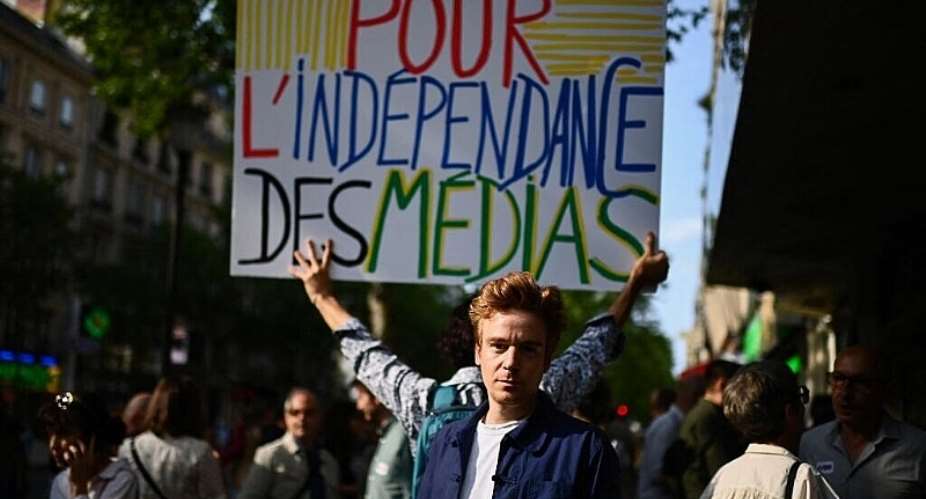This year's World Press Freedom index puts France in 21st place out of 180 countries – a slight improvement on 2023. But a report by Reporters Without Borders (RSF) warns that the right to information continues to be threatened by a legislative loophole that gives authorities the power to prosecute journalists for revealing their sources.
By moving up three spots, France ranks among among the countries in a “fairly good situation”, says RSF in its annual index published each year on World Press Freedom Day.
But this progress can be explained by a greater deterioration in other countries, says RSF's Pavol Szalai, in charge of the EU and Balkans regions.
“France remains 14th out of the 27 EU member states, which is not a very good position,” Szalai told RFI pointing to a “mixed record”.
Shortcomings in the French system were highlighted in September last year when French journalist Ariane Lavrilleux was arrested for allegedly compromising defence secrets in revelations over a joint military operation between France and Egypt.
She was held in police custody for 39 hours, searched and pressured to reveal her sources, following a complaint from the Ministry of Defence.
The case is still open, and while she has not been indicted, she told RFI she “could be at any time”.
'Vague' law
The Lavrilleux case highlights a paradox in France's law on press freedom.
Enacted on 29 July 1881, the Press Freedom Act specifically protects confidentiality of sources.
But it was amended in 2010 to stipulate that “the confidentiality of sources may not be directly or indirectly breached unless there is an overriding imperative in the public interest to do so”.
The notion of “overriding imperative" is not defined. “It's a very vague notion that allows investigators to abuse their power” Szalai told RFI.
While the 2010 amendment was supposed to strengthen the protection of journalists and their sources, the addition of this "vague phrase" marks "an enormous step backwards”, says lawyer Benoît Huet.
“At any moment, journalists are exposed to their sources being violated. That's serious,” he adds.
RSF is calling for the words “overriding imperative” to be removed from the law and replaced by a more limited and precise provision that will provide “greater protection for the confidentiality of sources, the cornerstone of press freedom”, Szalai says.
Stronger European legislation
In March, the European parliament adopted the Media Freedom Act to protect EU journalists and media from political or economic interference.
It includes a ban on the use of spyware against journalists, the obligation to disclose information on media ownership and mechanisms to prevent very big online platforms from arbitrarily restricting press freedom.
Anenquiry by Disclose investigative website revealed that France had lobbied hard for an exemption authorising the surveillance of journalists in the name of “national security”.
The reference to national security was dropped in the final version, partly due to campaigning by RSF.
Szalai says the additional EU framework and binding law, shortly to come into force, will "provide better protection for the confidentiality of sources".
Meanwhile, here in France, a group of journalists recently launched the French Observatory of Press Freedom Violations (Ofalp) to keep a record of all attacks on the press. Lavrilleux told RFI it reflected “the widespread feeling that the right to information is increasingly under threat in France”.
The idea is gather enough concrete evidence to “start a debate in France, or even a power struggle with the government […] to change the laws that facilitate and encourage attacks on journalists”.





 List of 24 ministerial nominees approved by Parliament
List of 24 ministerial nominees approved by Parliament
 You were my inspiration, made me who I am today – Lilian Kumah
You were my inspiration, made me who I am today – Lilian Kumah
 Rainstorm destroys Hohoe E.P. Senior High School building
Rainstorm destroys Hohoe E.P. Senior High School building
 John Kumah strongly supported me to become NPP flagbearer – Bawumia reveals
John Kumah strongly supported me to become NPP flagbearer – Bawumia reveals
 Late John Kumah urged me to run for NPP flagbearer, strongly supported me — Bawu...
Late John Kumah urged me to run for NPP flagbearer, strongly supported me — Bawu...
 Akufo-Addo appoints Joseph Kpemka as Deputy MD of BOST
Akufo-Addo appoints Joseph Kpemka as Deputy MD of BOST
 Ablakwa petitions CHRAJ to investigate sale of SSNIT's hotels to Rock City Hotel
Ablakwa petitions CHRAJ to investigate sale of SSNIT's hotels to Rock City Hotel
 MoF to provide new bailout for defunct Gold Coast Fund investors – Bawumia revea...
MoF to provide new bailout for defunct Gold Coast Fund investors – Bawumia revea...
 OMCs implement price adjustments despite International petroleum price declines
OMCs implement price adjustments despite International petroleum price declines
 Petition to remove Kissi Agyebeng will disrupt operations of OSP – Martin Kpebu
Petition to remove Kissi Agyebeng will disrupt operations of OSP – Martin Kpebu
